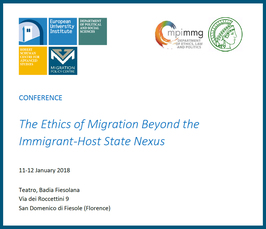"The Ethics of Migration Beyond the Immigrant-Host State Nexus"
Workshops, conferences 2018
- Beginn: 11.01.2018 09:30
- Ende: 12.01.2018 18:30
- Ort: Teatro, Badia Fiesolana | Via dei Roccettini 9 | San Domenico di Fiesole (Florence)

For more details please contact migration.ethics(at)eui.eu.
Over the last three decades, normative political theorists have devoted much attention to the issue of migration. However, most of this literature has singularly focused on the relationship between individual migrants and their state of destination. The debate centres on two sets of questions. The first is whether states have a right to keep would-be immigrants out or whether, conversely, migrants have a right to cross international borders. The second is whether states have a duty to extend citizenship or more limited packages of rights to migrants living in their territory and whether those migrants have a duty to integrate into their host society. Yet the constellation of actors involved in regulating international mobility comprises many more stakeholders. These include, among others, migrants’ countries of origin; subnational and supranational levels of government (such as municipalities, provinces and regional unions); sedentary citizens; commercial companies; and civil society organisations such as trade unions, churches, NGOs and activist groups.
Recent developments illustrate the importance of considering the rights and duties of these actors in their various relationships. The influence that increasingly assertive sending states seek to exert over their diasporas has prompted questions about the rights and duties of such states in relation to their expatriate populations as well as the states that host them. The sharp tightening of immigration controls, particularly in Trump’s America and on the eastern and southern borders of the European Union, has raised questions about the rights and duties of ordinary citizens and civil society organisations to resist and frustrate unjust migration policies and practices. And the unprecedented scale of the refugee crisis in the Middle East and Europe has foregrounded questions of burden-sharing between host countries and the right of supranational institutions to enforce shared duties of assistance.
This conference provides a forum to explore these and related normative questions. In doing so, it hopes to contribute to a more comprehensive debate on migration ethics, one that moves beyond the focus on what migrants and host states owe each other, to examine the complex structure of rights and duties migrants, sending states, host states, different levels of government, nonstate actors, and ordinary citizens hold vis-à-vis each other.
The conference also features the photography
exhibition ‘The Game’ by Mario Badagliacca, which can be found in the
Cloister of the Badia Fiesolana